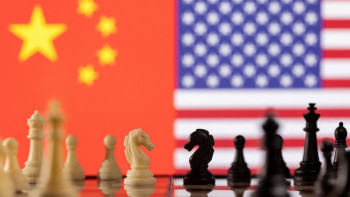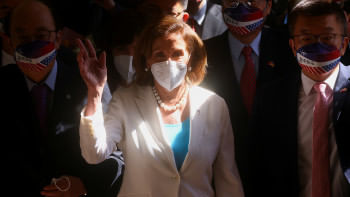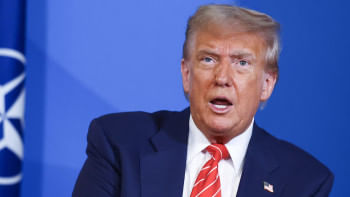US-China tensions: Crossing the red lines to nuclear war

Now that the pomp and glory of US Speaker Nancy Pelosi's visit to Taiwan is over, and China has held military exercises surrounding Taiwan, what has been achieved other than further worsening of US-China relations? The crumbling of the current world order is like an earthquake disaster. Initially everything looks fine, then cracks and tremors begin to appear, and events accelerate until the actual earthquake occurs with massive devastation.
The difference between earthquakes and war is that the latter is human-induced and should, in theory, be avoidable. The Thucydides Trap is less about whether Great Powers will fight and more about whether it is avoidable. History has rewarded heroes when they win wars, but has seldom praised statesmen who have avoided wars.
History will debate whether the Russia-Ukraine war was avoidable. So far, it is a non-nuclear war because Russia warned Nato not to provoke a nuclear situation. Nato, at least, understands that the Cold War, fought between 1946 and 1991, did avoid a nuclear war. Both sides understood that nuclear war was MAD (mutually assured destruction). There were lots of proxy wars, such as the Korean war, where the Soviets pushed China to do the fighting, or Afghanistan, where the US financed Islamist forces to wear down the Soviet forces. The Cuban missile crisis was defused when the Russians agreed to remove missiles from Cuba, provided the Americans removed missiles from Turkey. Both sides decided to back down from each other's "red lines," the crossing of which would escalate beyond either side's control.
The American economist who had the most influence on shaping the understanding of nuclear options was Thomas C Schelling (1921-2016). His Nobel laureate lecture, titled "An Astonishing Sixty Years: The Legacy of Hiroshima," reminds us how lucky and rational we were so far in avoiding nuclear escalation. Schelling's great attribute was to apply intellectual rigour and common sense to very uncomfortable questions. He thought through the unthinkable. A leading game theorist, he understood that all human decisions are interdependent, contingent upon someone else's behaviour, the most common being "tit for tat."
But common sense at the individual level does not always work at the global level. Married couples who want a divorce can appeal to a court for independent judgement. Great Powers cannot appeal to any higher court, not even the United Nations, because they have the veto over any ruling. Thus, the only global rule is that Great Powers must reach understandings with each other and not cross each other's red lines, beyond which they will clash.
In a unipolar world where the hegemon power can enforce order, there is what economists call "equilibrium." But as Schelling warned, equilibrium is only a result of balance, but when the unipolar order fragments into a multipolar order or disorder, you can get "far-from-equilibria" results. Biden's "Build Back Better" framework seeks to get back to a semblance of unipolar position, but having crossed Russia's red line over Ukraine, war has broken out. It is contained so far because it is a proxy war where only the Ukrainians are dying, while Nato provides the arms. But if emotions get too high, attacking nuclear plants can also escalate to a nuclear conflagration, which cannot be contained.
Pelosi's trip, to some extent, has already crossed China's red line, which is about One China policy including Taiwan, not "One China, One Taiwan." China has just published its White Paper on Taiwan, which spells out China's red line on Taiwan.
What we face today is a situation that, until recently, few dreamt would be possible – that the US and its allies may be crossing two red lines and engage in a two-front war at the same time. It is no longer a fantasy to imagine that a third front could break out in the Middle East with Israeli-Palestinian tension.

Schelling's warning was that "nuclear weapons, once introduced into combat, could not, or probably would not, be contained, confined or limited." In other words, if non-nuclear options cannot arrive at mutually accepted conclusions or decisions, nuclear options would be used. If warring parties are not willing to negotiate, then escalation would rise inevitably to a nuclear option.
The only solution to this is to shift radically away from brinkmanship and avoid playing the current game of chicken – namely, who blinks first. When the leading military power is no longer assured of winning on all fronts, (and that is still a big "if"), it is the insecurity that creates conditions for chaos. Once the US moves away from "constructive ambiguity" to the certainty of action, such as legal commitment to go to war on Taiwan, then it becomes hostage to Taiwan acting recklessly or even accidentally to provoke war, in which recent US war games show that the losses for everyone are horrendous.
The rational game does not have stable equilibria (as solutions) when emotions run higher and higher because both sides, civilians and the military, cannot predict how the other would behave and therefore pre-empt losses by engaging in first strikes. The UN secretary-general was correct in warning the nuclear powers to commit to "no-first-use" policy. No peace process is possible without all nuclear powers sitting down to discuss how to de-escalate the present situation.
As Schelling understood, the only way out of this nuclear conundrum is for Big Powers to rebuild trust and agree to disagree, including appreciating how not to cross each other's red lines. Interdependent decision-making requires self-restraint by the major players. But the way the current media is fanning emotions, no leader can afford to look weak to their domestic audience. Hence, "tit for tat" means escalation until eventually red lines will be crossed – not by intention, but by abstention.
Perilous times need statesmen who are not absent from the big decisions of our times. Democracy assumes that great leaders will emerge with great wisdom to fulfil the will of the people. But if the will of the people is misled into mutual Armageddon, then instead of the dialogue of the deaf, we may have the swan song of the dead.
Andrew Sheng is a distinguished fellow of Asia Global Institute, University of Hong Kong, and chief adviser to the China Banking Regulatory Commission.
Copyright: Asia News Network

 For all latest news, follow The Daily Star's Google News channel.
For all latest news, follow The Daily Star's Google News channel. 










Comments